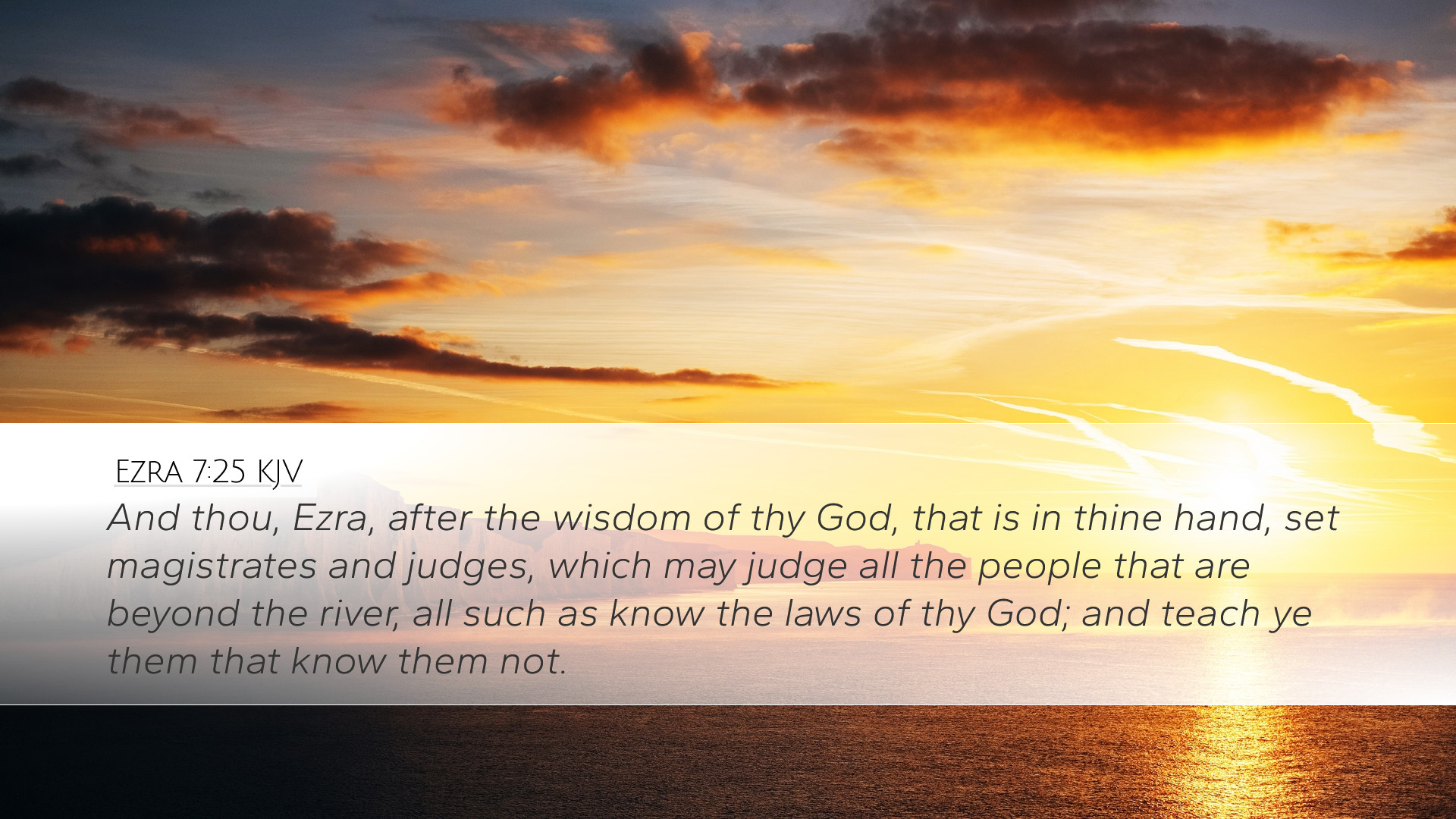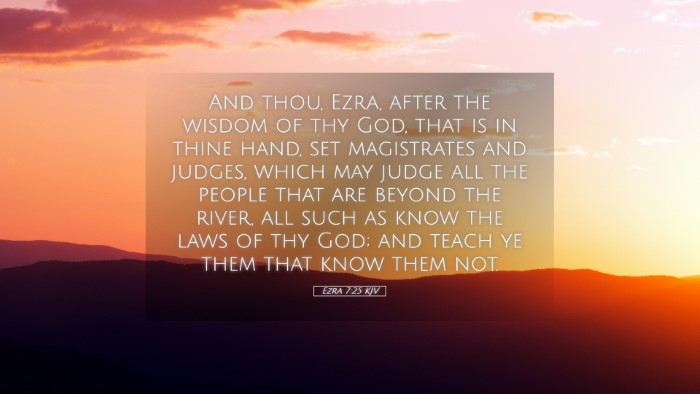Old Testament
Genesis Exodus Leviticus Numbers Deuteronomy Joshua Judges Ruth 1 Samuel 2 Samuel 1 Kings 2 Kings 1 Chronicles 2 Chronicles Ezra Nehemiah Esther Job Psalms Proverbs Ecclesiastes Song of Solomon Isaiah Jeremiah Lamentations Ezekiel Daniel Hosea Joel Amos Obadiah Jonah Micah Nahum Habakkuk Zephaniah Haggai Zechariah MalachiEzra 7:25
Ezra 7:25 KJV
And thou, Ezra, after the wisdom of thy God, that is in thine hand, set magistrates and judges, which may judge all the people that are beyond the river, all such as know the laws of thy God; and teach ye them that know them not.
Ezra 7:25 Bible Commentary
Ezekiel 7:25 - A Comprehensive Commentary
Ezra 7:25 is a pivotal verse in the narrative of Ezra’s mission to restore proper worship in Jerusalem and re-establish the Mosaic Law as central to the life of the Jewish people. The verse reads:
"And thou, Ezra, after the wisdom of thy God, that is in thine hand, appoint magistrates and judges, which may judge all the people that are beyond the river, all such as know the laws of thy God; and teach ye them that know them not."
Contextual Background
This verse is part of a larger narrative focusing on the leadership of Ezra, a priest and scribe, who returns from Babylon to Jerusalem in the Persian Empire's period. It reflects the growing importance of the Law and worship in the life of the post-exilic community.
Insights from Public Domain Commentaries
Matthew Henry
Matthew Henry emphasizes the divine appointment and empowerment of Ezra for his leadership role. He suggests that Ezra is not merely a leader but a wise and godly man who recognizes the importance of implementing God's law among the people. Henry notes:
- Wisdom of God: Ezra's wisdom is described as being divinely inspired, equipping him to govern with godly principles. This wisdom is crucial for creating a righteous society.
- Establishment of Justice: The call to appoint judges and magistrates signifies the necessity of establishing a system of justice based upon the laws of God. Henry highlights that this was essential for restoring order and righteousness in a land that had faced great turmoil.
- Teaching the Law: Ezra is tasked not only with making judicial appointments but also with teaching the Law. This teaching role underscores the importance of knowledge and obedience to God's commands among the populace.
Albert Barnes
Albert Barnes provides further elaboration on Ezra’s role and responsibilities as the leader of the Jewish people returning from exile. Barnes points out the significance of the term “beyond the river,” referring to the territory over which Ezra was given authority:
- Authority Given: Barnes explains that Ezra was granted autonomy and authority to appoint leaders in the lands populated by the Jewish exiles. This exemplifies the respect that the Persian authorities had for Ezra.
- Judicial System: He stresses that appointing magistrates and judges was not merely a legal duty but also a moral obligation to ensure that the people would live according to God's standards. The judges were to be knowledgeable in God's laws, highlighting the integration of faith and governance.
- Educational Responsibility: Barnes underscores Ezra's educational task as foundational for the community’s identity. By teaching those who did not know the law, Ezra sought to foster a community rooted in the knowledge and fear of God.
Adam Clarke
Adam Clarke adds a more pastoral emphasis to the responsibilities laid upon Ezra. He interprets the command as a comprehensive framework for spiritual and civic leadership:
- Spiritual Oversight: Clarke interprets Ezra’s role not only as a political leader but more importantly as a spiritual overseer. His leadership reflects the essential connection between governance and spirituality, crucial for the well-being of the community.
- Community Restoration: He stresses the importance of recreating a community that upholds the principles of justice, fairness, and righteousness as set forth by the Law. Clarke sees this as vital for the moral recovery of the people.
- Encouragement to Know God: Clarke points out that the emphasis on teaching those who are ignorant of God’s laws indicates a missional aspect of Ezra’s leadership. It serves as an encouragement for pastors and church leaders today to engage in teaching and uplifting their congregations.
Theological Reflections
From a theological perspective, Ezra 7:25 calls us to examine our understanding of wisdom, authority, and the responsibilities of leaders within the church and society:
- Wisdom in Leadership: Leaders today are reminded that godly wisdom, as exemplified by Ezra, is vital for making decisions that align with God’s will and promote justice.
- Integration of Faith and Life: The interplay between spiritual and civic responsibilities mirrors the challenge faced by modern believers to uphold their faith in various spheres of influence.
- Educational Mission: The charge to teach others reflects a broader call for discipleship and education within the church, urging believers to share the knowledge of God's word actively.
Conclusion
Ezra 7:25 serves as a profound reminder of the responsibilities and privileges afforded to those who lead. By examining the insights from public domain commentaries, we gain a deeper appreciation for the integration of spiritual authority, the implementation of justice, and the mission of teaching and uplifting others in the knowledge of God. This passage resonates powerfully in today’s church and community, urging leaders to cultivate a culture of wisdom, righteousness, and ongoing education in faith.


